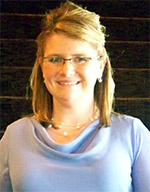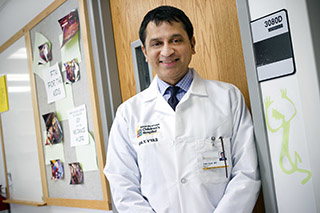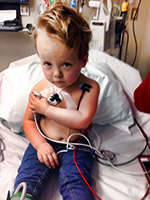When the celebration kicks off tonight (Friday, Feb. 7) for the 20th anniversary of University of Iowa Dance Marathon, which helps fund pediatric cancer research and pediatric cancer programs at University of Iowa Children’s Hospital, Leanne and Paul Thomas and their daughter, Mara, will be marking the 20th anniversary of another sort.

It’s the day the Thomas’ learned Mara, then just four days away from her third birthday, had a brain tumor.
“Mara was our first child so we didn’t know any better, and things were different then, but looking back now we probably could have diagnosed her ourselves, to some degree,” says Leanne Thomas, Mara’s mother. “She wasn’t doing some of the developmental things she should have been doing at that age. I thought it was strange, and my mom thought it was strange, but we didn’t think anything about it.”
The UI Dance Marathon will be broadcast live on UITV (Mediacom 17 in the Iowa City/Cedar Rapids area) and live streamed to the Dance Marathon website at dancemarathon.uiowa.edu/stream.
Mara’s slowed development turned into headaches and nausea, and her right eye was turned inward. Doctors in the Thomas’ home area of Aledo, Ill., dismissed the girl’s headaches, but Leanne and Paul remained persistent, and a family friend strongly encouraged them to come to UI Children’s Hospital. That was on Feb. 7, 1994.
“We took Mara to Iowa City and they took her back for an MRI and everything else,” Leanne says. “Then suddenly a whole team of doctors came in with a box of Kleenex, so we knew something was really wrong. We went from ruling something out to being in the hospital until April.”
There were fears of losing their daughter—or of their daughter facing losses of her own—at every turn. The first hurdle was the surgery to remove the tumor itself. Leanne says Mara wasn’t expected to survive, and if she did, it was likely that she wouldn’t be able to speak or walk. Yet coming out of recovery, the first thing Mara did was ask for her mommy.
Today, Mara is looking forward to her 23rd birthday on Feb. 11. She has her own place in Aledo, and works in her parents’ health food store, Blessed by Nature. There are still some lingering effects from both the brain tumor and the treatments: one foot is three sizes bigger than the other, and the part of her brain that lets her work math problems is hindered. She has some vision loss in her right eye, enough that it prevents her from driving in town.
Leanne keeps up on some cancer research. She’s confident her daughter got the best care available, and is proud of the continued research and progress that is being made for future generations.
* * *

Like most cancer researchers, Dr. Yatin Vyas, hopes to one day have to refocus his science because there will be no cancer. Until then, the pediatric cancer researcher says his immediate vision is to help develop a treatment that directly targets the individual cancer cells and doesn’t damage the little bodies containing them.
“My hope is that it will be a directed therapy, that we would identify a pathway for which we would have a drug, a pill form, that would go straight to the cancer, and would allow the person to live with a minimum of side effects for a longer time,” he says. “It can be done. The excitement is really palpable—people really believe there is something on the horizon.”
Vyas was named the Mary Joy and Jerre Stead Professor of Pediatric Hematology/Oncology at the UI Carver College of Medicine in July 2013 but has been a leading pediatric cancer researcher across the country for more than 20 years. He knows the traditional cancer treatments—chemotherapy, surgery, and radiation—can take their toll on any cancer patient’s body, but particularly on that of a young child.
Vyas wants to remove that risk. He says personalized medicine—taking a closer look at a person’s own cancer cells and treating them according to that person’s individual genetic makeup—will help researchers develop treatments that can target those cancer cells on their own, rather than sending radiation or chemotherapy to an entire region. He hopes to be able to treat different cancers with a pill, not with radiation or chemotherapy.
In fact, there’s just one place he says people should see the medical tools used to deliver radiation and chemotherapy.
“They belong in a medical museum, right next to the iron lung,” he says.
* * *
Vyas’s visions for the future are just fine for Ben and Michaela Sanderson of Ely, Iowa, who have spent the last 14 months watching as their daughter, 2-year-old Nora, has dealt with the reality of cancer treatments. Early in the fall of 2012, Nora began having ear infections and waking up during the night—something that was not common for her, even at her young age. Her pediatricians assured the family it was a virus, but when it kept recurring, Ben and Michaela were referred to UI Children’s Hospital.

Within hours she was diagnosed with leukemia and had a bone marrow biopsy scheduled. A few days later, she’d receive her first chemotherapy treatment.
“I think the world stopped turning for a while, especially for me,” Ben says now. “I think I’m the physically stronger one between my wife and I, but the roles reversed with Nora’s illness and Michaela is the one who kept it together for that first week or two for both of us. I had never known any kids with cancer before that – going through all of that was difficult.”
Still a year away from the end of her 2 ½-year-long treatment—her last chemotherapy treatment is set for Valentine’s Day, 2015—Nora is still a bundle of energy and optimism that surprises and amazes her parents daily.
“One of the concerns we had was that the chemo would cause some learning delays, but she’s just smarter than anything,” Ben says. “Her comprehension is out of this world. She’s funny, witty, knows how to joke.”
He knows cancer research and treatment have come a long way, even in the 20 years that organizations like Dance Marathon have been helping to fund research initiatives. He also knows the dangers still exist—pediatric cancer patients face risks of other cancers later in life, he says, as well as of other effects from the chemotherapy.
His wish for his daughter isn’t that different that Vyas’s wish for all pediatric cancer patients.
“I want her to beat this thing with as few side effects and for as long a term as possible,” he says. “The chemo and stuff going through her body at such a young age, there’s a chance of secondary cancers developing later on—my wish is that she would come out of this with a clean slate.”